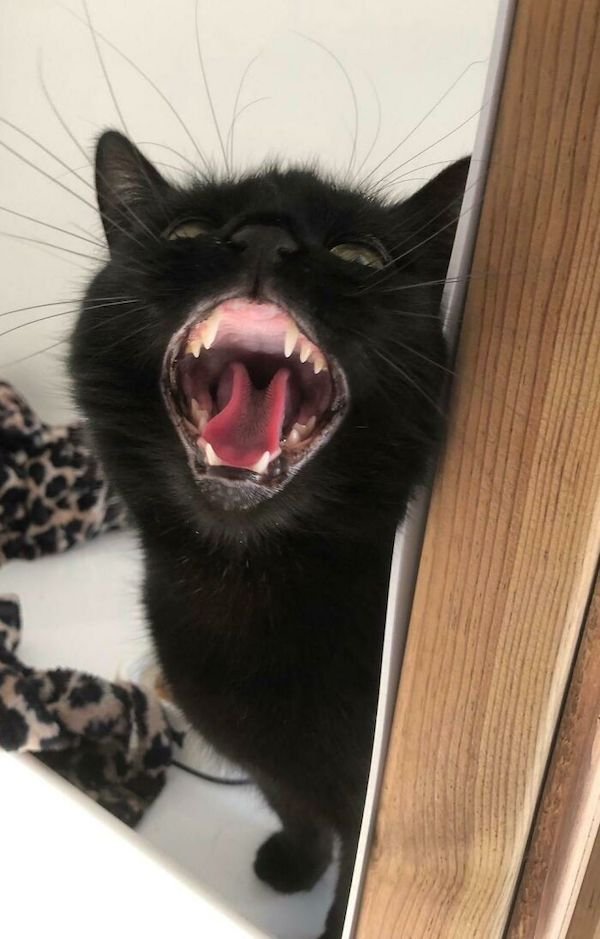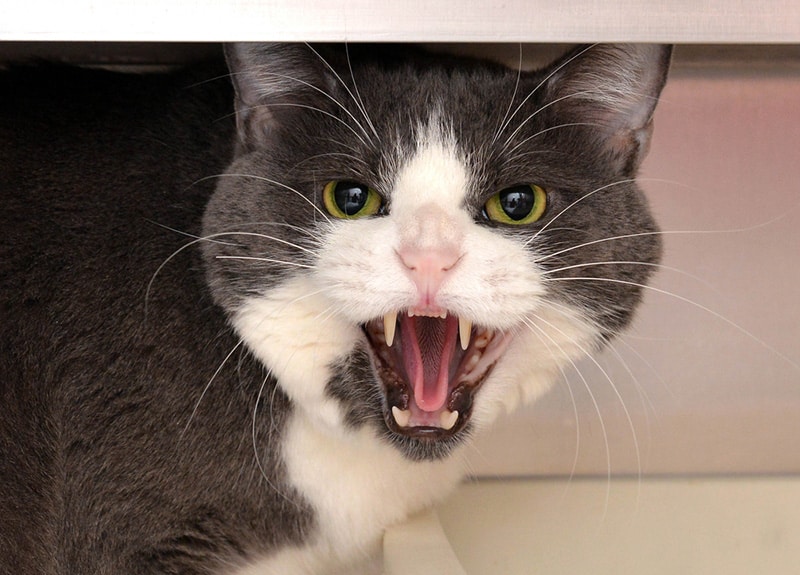Uncover The Secrets Behind A Cat's Screaming Frenzy At The Vet
Why do cats scream at the vet? Cats are notorious for their independent nature and dislike of change, so it's no wonder that they often express their displeasure at the vet's office with a good, old-fashioned scream.
Cats may scream at the vet for several reasons. They may be scared of the unfamiliar surroundings, the strange smells, and the people handling them. They may also be in pain or discomfort, especially if they are being examined or treated for an injury or illness.
Whatever the reason, it's important to remember that cats screaming at the vet is a normal reaction. It's their way of communicating their fear, pain, or discomfort. If your cat is screaming at the vet, try to stay calm and reassure them. You can also try to distract them with a toy or treat.
- Simon Cowell Son Diagnosis
- Lucky Crush
- Yumi Eto Onlyfans Leaks
- Antonia Lofaso Relationships
- Subhashree Viral Video
If your cat's screaming is severe or persistent, it may be a sign of a more serious problem. In this case, it's important to take your cat to the vet for a checkup.
Cat at the Vet Screaming
Cats are notorious for their independent nature and dislike of change, so it's no wonder that they often express their displeasure at the vet's office with a good, old-fashioned scream. There are several reasons why cats may scream at the vet, including fear, pain, and discomfort. It's important to remember that this is a normal reaction for cats, and there are things you can do to help them cope.
- Fear: Cats are creatures of habit, and they don't like change. The vet's office is a strange and unfamiliar place, and it can be scary for cats. The unfamiliar smells, sights, and sounds can all contribute to their fear.
- Pain: If your cat is screaming at the vet, it may be because they are in pain. This could be due to an injury, illness, or even just a simple procedure like a nail trim. It's important to let the vet know if your cat is screaming, so they can check for any signs of pain.
- Discomfort: Even if your cat is not in pain, they may still be uncomfortable at the vet's office. This could be due to the way they are being handled, or it could be because they are feeling restrained. It's important to try to make your cat as comfortable as possible while they are at the vet.
- Communication: Cats scream to communicate their emotions. If your cat is screaming at the vet, they are trying to tell you something. It's important to listen to your cat and try to understand what they are trying to say.
- Attention: Some cats scream at the vet because they want attention. They may have learned that screaming gets them what they want, so they keep doing it. It's important to ignore your cat if they are screaming for attention.
If your cat is screaming at the vet, there are several things you can do to help them cope. First, try to stay calm and reassure them. You can also try to distract them with a toy or treat. If your cat's screaming is severe or persistent, it may be a sign of a more serious problem. In this case, it's important to take your cat to the vet for a checkup.
- Rain Brown Net Worth
- Tia Hernlen Now
- Jonathan And Suzy Lamb Not On Daystar
- Marie Temara Onlyfan
- Maruchan Ramen Recall 2024
Fear
Cats are creatures of habit, and they don't like change. The vet's office is a strange and unfamiliar place, and it can be scary for cats. The unfamiliar smells, sights, and sounds can all contribute to their fear. This fear can manifest itself in a number of ways, including screaming. Cats may also try to hide, run away, or become aggressive.
It is important to understand that fear is a normal reaction for cats in the vet's office. It is important to be patient and understanding with your cat, and to try to make the experience as stress-free as possible. You can do this by:
- Bringing your cat to the vet regularly for checkups and vaccinations. This will help them get used to the environment and the staff.
- Talking to your cat in a soothing voice and petting them before and during the appointment.
- Bringing a toy or treat to the appointment to help distract your cat.
- Asking the vet or vet tech to show you how to properly restrain your cat. This will help to prevent them from feeling scared or trapped.
By following these tips, you can help to make your cat's vet visits less stressful and more positive.
In conclusion, fear is a common cause of screaming in cats at the vet. It is important to understand that this is a normal reaction, and to be patient and understanding with your cat. By following the tips above, you can help to make your cat's vet visits less stressful and more positive.
Pain
It is important to be aware of the signs of pain in cats, as they can be subtle. Some common signs of pain in cats include:
- Hiding
- Lethargy
- Loss of appetite
- Aggression
- Vocalizing (e.g., screaming, hissing, growling)
If you think your cat may be in pain, it is important to take them to the vet as soon as possible. The vet will be able to examine your cat and determine the cause of the pain. They will also be able to prescribe medication or recommend other treatments to help your cat feel more comfortable.
Here are some specific examples of how pain can be connected to "cat at the vet screaming":
- A cat that is screaming at the vet may be in pain because they have an injury, such as a broken bone or a wound.
- A cat that is screaming at the vet may be in pain because they have an illness, such as a urinary tract infection or a dental problem.
- A cat that is screaming at the vet may be in pain because they are undergoing a procedure, such as a nail trim or a blood draw.
It is important to remember that pain is a common cause of screaming in cats at the vet. If your cat is screaming, it is important to take them to the vet as soon as possible so that they can be examined and treated.
Discomfort
Discomfort is a common cause of screaming in cats at the vet. Cats are very sensitive animals, and even minor discomfort can cause them to become stressed and vocal. There are a number of things that can contribute to discomfort in cats at the vet, including:
- Handling: Cats do not like to be handled, and they may become stressed and vocal if they are handled in a way that they find uncomfortable. It is important to handle cats gently and with care, and to avoid restraining them too tightly.
- Restraint: Cats may also become stressed and vocal if they are feeling restrained. This is especially true if they are restrained in a way that prevents them from moving or escaping. It is important to use a restraint that is comfortable for your cat and that allows them to move around freely.
- Environment: The environment at the vet's office can also be stressful for cats. The unfamiliar smells, sights, and sounds can all contribute to their discomfort. It is important to try to make the environment as comfortable as possible for your cat, by bringing a familiar blanket or toy with them, and by talking to them in a soothing voice.
By following these tips, you can help to make your cat's vet visits less stressful and more positive.
Communication
Cats are very expressive animals, and they use a variety of vocalizations to communicate their emotions. Screaming is one of the most common vocalizations that cats use, and it can be used to express a variety of emotions, including fear, pain, and discomfort.
When your cat is screaming at the vet, it is important to pay attention to their body language and other cues to try to understand what they are trying to say. If your cat is screaming and also showing signs of fear, such as dilated pupils, flattened ears, and a tucked tail, then it is likely that they are scared. In this case, it is important to try to calm your cat down and reassure them that everything is going to be okay.
If your cat is screaming and also showing signs of pain, such as limping, holding a paw up, or vocalizing when you touch a certain area of their body, then it is likely that they are in pain. In this case, it is important to take your cat to the vet as soon as possible so that they can be examined and treated.
If your cat is screaming and also showing signs of discomfort, such as panting, drooling, or pacing, then it is likely that they are uncomfortable. In this case, it is important to try to make your cat more comfortable by providing them with a quiet place to rest, offering them water, and avoiding handling them too much.
By understanding the different reasons why cats scream, you can better understand what your cat is trying to tell you when they are screaming at the vet. This can help you to provide your cat with the care and support that they need.
Attention
Cats are very intelligent animals, and they are capable of learning how to get what they want. If a cat learns that screaming gets them attention, they will continue to scream in order to get attention. This is a common problem in cats who are spoiled or who have been taught that screaming is an acceptable way to get attention.
It is important to ignore your cat if they are screaming for attention. If you give them attention when they are screaming, you are reinforcing the behavior and teaching them that screaming is an effective way to get what they want. Instead, you should only give your cat attention when they are being quiet and well-behaved.
Ignoring your cat when they are screaming for attention may be difficult at first, but it is important to be consistent. If you give in and give them attention even once, they will learn that screaming is an effective way to get your attention, and they will continue to do it.
By ignoring your cat when they are screaming for attention, you can teach them that screaming is not an effective way to get what they want. This will help to reduce the amount of screaming that your cat does, and it will also help to improve your cat's behavior overall.
FAQs about "Cat at the Vet Screaming"
This section addresses frequently asked questions and misconceptions surrounding the topic of "cat at the vet screaming" to provide comprehensive and informative answers.
Question 1: Why do cats scream at the vet?
Answer: Cats may scream at the vet due to various reasons, including fear of the unfamiliar environment, discomfort caused by handling or restraint, pain from an underlying medical condition, or anxiety due to separation from their owners. Some cats may also exhibit vocalizations as a form of communication to express their distress or seek attention.
Question 2: Is it normal for cats to scream at the vet?
Answer: Yes, it is relatively common for cats to exhibit vocalizations such as screaming or meowing at the vet. These reactions are often a reflection of their natural instincts and can be influenced by factors like fear, anxiety, or discomfort in the unfamiliar clinical setting.
Question 3: How can I help my cat feel more comfortable at the vet?
Answer: To help reduce your cat's anxiety and discomfort during vet visits, consider the following tips: Familiarize them with the carrier beforehand, provide a comforting item like a blanket or toy, stay calm and reassuring throughout the appointment, and inquire about pheromone sprays or calming aids recommended by your veterinarian.
Question 4: What should I do if my cat screams excessively at the vet?
Answer: If your cat exhibits excessive or persistent screaming at the vet, it's important to inform the veterinarian. They can assess your cat's behavior, determine any underlying medical causes, and provide appropriate recommendations to address the excessive vocalizations.
Question 5: Can I prevent my cat from screaming at the vet?
Answer: While it may not be entirely preventable, there are proactive measures you can take to minimize the likelihood of excessive screaming. Regularly exposing your cat to positive experiences at the vet, such as routine check-ups or treats, can help them become more comfortable with the environment. Additionally, providing a safe and calming home environment can contribute to their overall well-being and reduce anxiety during vet visits.
Question 6: Are there any underlying health issues that can cause cats to scream at the vet?
Answer: Yes, in some cases, underlying health conditions or pain can trigger excessive vocalizations in cats at the vet. Conditions such as urinary tract infections, dental problems, or injuries can cause discomfort or pain, leading to screaming as a means of expressing distress. It's important to consult with your veterinarian to rule out any underlying medical issues that may be contributing to your cat's screaming behavior.
Summary: Understanding the reasons behind "cat at the vet screaming" can help cat owners provide appropriate care and support. By addressing common concerns and misconceptions, this FAQ section aims to empower cat owners with knowledge and strategies to navigate vet visits more effectively and ensure their feline companions' well-being.
Transition to the next article section: For further insights into cat behavior and veterinary care, explore the following sections, where we delve into specific topics related to cat health, behavior, and veterinary practices.
Conclusion
Cat at the vet screaming is a common occurrence that can be distressing for both cats and their owners. By understanding the reasons behind this behaviour, cat owners can take steps to reduce their cat's anxiety and make vet visits more positive experiences.
In conclusion, it is important to remember that screaming is a normal way for cats to communicate their fear, pain, or discomfort. By being patient and understanding, and by following the tips outlined in this article, you can help your cat to feel more comfortable and less stressed at the vet.
- Jung So Min Husband 2024
- Aishah Sofey Of Leak
- Kyla Yesenosky
- Simon Cowell Funeral Date And Time
- Is Howard Sterns Mom Ok

Screaming Cats (30 pics)

Redirected Aggression in Cats VetReviewed Causes & How to Stop It

Screaming Cat Meme